PHOTOS: Holyrood applause for Ghanaian president John Mahama
- Posted on
- Comment
The president of Ghana was given polite applause by MSPs despite controversy over the country’s human rights record.
John Dramani Mahama attended First Minister’s Questions at Holyrood as part of a trip to Scotland to promote trade links.
Mr Mahama was due to meet the first minister and the presiding officer at the Scottish Parliament.
But a scheduled meet and greet with opposition leaders was cancelled ahead of his visit.
First Minister Nicola Sturgeon was among those who applauded Mr Mahama, who was sitting in the VIP gallery with his wife Lordina, when he was introduced to the chamber, but some other MSPs did not.
‘Africa is emerging’
The president and his entourage left before the end of the weekly session to prepare for an address to MSPs shortly afterwards, where he pointed to Ghana’s six consecutive elections as evidence of how “Africa is emerging” and building a base of democracy.
Amnesty International has criticised Ghana’s record on torture, gay rights and violence against women.
Vigilante groups are said to be targeting gay people in the West African country, where anyone convicted of homosexuality faces up to three years in jail.
Amnesty has also said that the police and intelligence services use torture and other ill-treatment against Ghanaian citizens, and it has recorded several cases of excessive force.
Naomi McAuliffe of Amnesty said: “Although President Mahama’s visit is primarily about trade, we urge the Scottish government and MSPs meeting him to be aware of these human rights abuses and take the opportunity to raise the issues.”
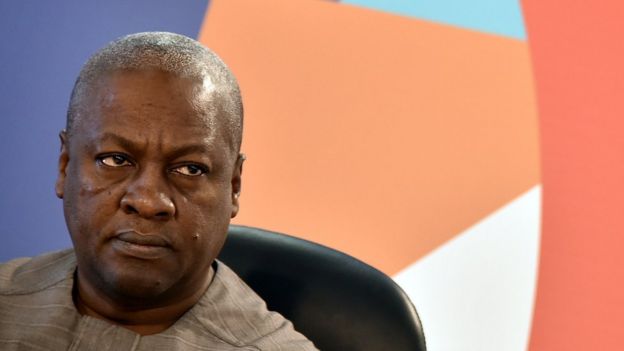 Image copyrightGetty Images
Image copyrightGetty ImagesBut gay rights charity Stonewall said it had “seen some promising statements from President Mahama criticising violence against LGBT communities”.
Mr Mahama’s visit to Scotland will also see the president receive an honorary degree from the University of Aberdeen on Friday.
He was welcomed to the Scottish Parliament by presiding officer Tricia Marwick, who said it would be her “great pleasure” to “extend the hand of friendship and seek to strengthen the economic and democratic ties between our two countries.”
‘Strong view’
A Scottish Parliament spokesman said the presiding officer’s role was “always of political impartiality and neutrality” and it would therefore not be for her to “raise political matters during a courtesy call.”
Responding to calls from opposition leaders, a Scottish government spokeswoman said the first minister would “share her strong view that the Commonwealth values of humanity, equality and tolerance are universal values” during Mr Mahama’s visit.
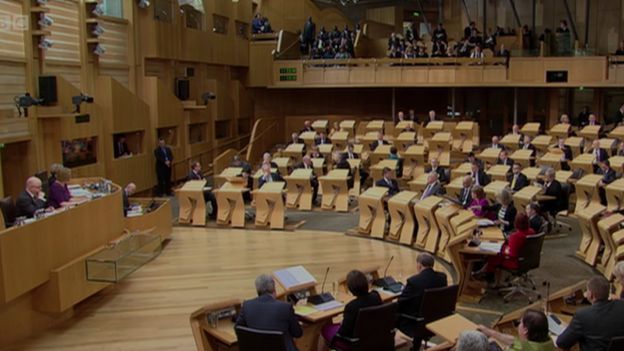
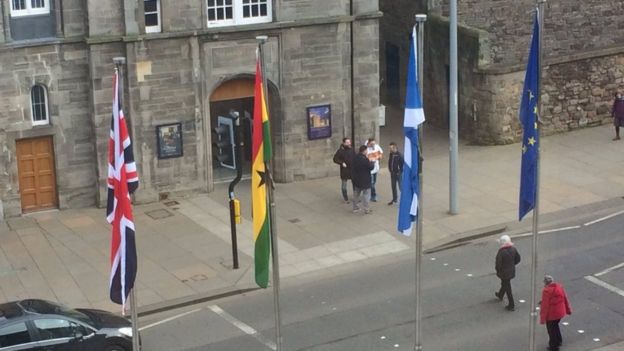
Independent MSP John Finnie has lodged a motion at Holyrood claiming that the president has given his “full support” to “discriminatory laws and relentless persecution” of LGBT people in Ghana.
And the Scottish Human Rights Commission said it expected the Scottish government and parliament to “show leadership protecting and promoting international human rights standards.”
Stonewall said Ghana was one of 75 countries in the world where it was still illegal to be gay.
A spokesman said: “While we’ve seen some promising statements from President Mahama criticising violence against LGBT communities, we believe that the Scottish government has an important responsibility to help advance the protection of LGBT rights across the world.”
Plastic pollution
A University of Aberdeen spokesman said the decision to confer an honorary doctorate on Mr Mahama took into account “his work on child poverty and children’s rights, the role he has played in the fight against Ebola, and our large Ghanaian student and graduate population.”
It comes at a time when offshore oil production is helping to fuel Ghana’s fast-growing economy, with Mr Mahama’s visit said to “offer an opportunity to forge stronger links with Scotland’s industrial and engineering expertise.”
It was the second time a Ghanaian president has visited the Scottish Parliament.
In 2000, President Jerry Rawlings addressed MSPs at the Mound, the parliament’s previous location.
Mr Mahama was sworn in as the President sworn in as the President of Ghana following the death of John Atta Mills in 2012, before winning an election later in the same year.
He is generally regarded as a champion of the underprivileged, and also has a keen interest in the environment, particularly the problem of plastic pollution in Africa.
Ghana is seen as being one of the more stable countries in West Africa since its transition to multi-party democracy in 1992.
But in February last year, celebrities took to social media to condemn the beating of a suspected gay man.
The incident opened a rare window for debate on homosexuality in the country.
-BBC

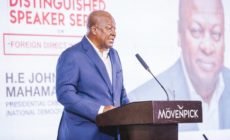

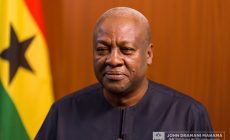






 (Selorm) |
(Selorm) |  (Nana Kwesi)
(Nana Kwesi)